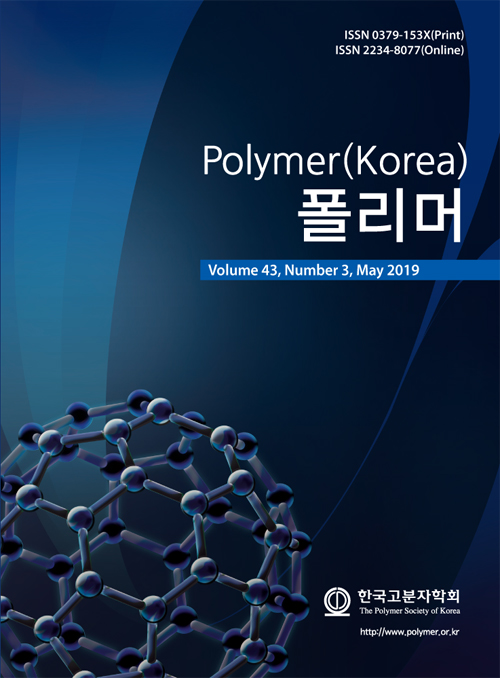- Single-Step Solution Polymerization and Thermal Properties of Copolyesters Based on High Trans-1,4-Cyclohexanedimethanol, Terephthaloyl Dichloride, and 2,6-Naphthalene Dicarboxylic Chloride
Fiaz Hussain, Jaemin Jeong, Sangwon Park, Soo-Jung Kang, and Jinhwan Kim†

Department of Polymer Science and Engineering, Sungkyunkwan University, 300 Cheoncheon-dong, Jangan-gu, Suwon, Gyeonggi 16419, Korea
- Trans와 Cis-1,4-Cyclohexanedimethanol, Terephthaloyl Dichloride, 2,6-Naphthalenedicarboxylic Chloride로부터 합성된 폴리에스터 공중합체의 단일 단계 용액 중합과 열적 특성
성균관대학교 고분자공학과
In this work, two series of poly(1,4-cyclohexylenedimethylene terephthalate-co-1,4-cyclohexylenedimethylene 2,6-naphthalenedicarboxylate) (PC#TN#) copolyesters were synthesized by a simple one-step solution polymerization method at room temperature without the use of stabilizer and metallic catalyst. Chemical compositions of obtained PC#TN# copolyesters were confirmed by nuclear magnetic resonance (1H NMR) spectroscopy. Thermal properties of synthesized copolyesters were determined by differential scanning calorimetry (DSC) and thermogravimetric analysis (TGA). Thermal properties of synthesized PC#TN# were controlled by varying the ratio of naphthalene units in diacid part and cis/trans-1,4-cyclohexanedimethanol (CHDM) isomers in diol part. An increased content of trans-CHDM can increase glass transition temperature (Tg) and melting temperature (Tm) profoundly. By increasing the content of naphthalene units, Tg increases linearly while Tm is first decreased then it starts to increase once the eutectic point (2,6-naphthalene dicarboxylic acid 36 mole%) is reached. Thermal degradation behavior of synthesized copolyesters was also significantly improved by increasing naphthalene and trans-CHDM units.
Poly(1,4-cyclohexylenedimethylene terephthalate-co-1,4-cyclohexylenedimethylene 2,6-naphthalenedicarboxylate) (PC#TN#) 폴리에스테르 공중합체를 안정제 및 금속 촉매를 넣지 않고 실온에서 단일 단계 용액 중합법으로 합성하였다. 얻어진 PC#TN# 폴리에스테르 공중합체의 화학 구조는 1H NMR로 규명하였고, 열특성은 TGA와 DSC로 확인하였다. 열적 특성은 diacid 부분의 나프탈렌 단위와 diol 부분의 cis/trans-1,4-cyclohexanedimethanol(CHDM) 이성질체의 비율을 변화시킴으로써 조절하였다. trans-CHDM의 증가된 함량은 유리 전이 온도(Tg) 및 용융 온도(Tm)를 증가시킬 수 있었다. 나프탈렌 단위의 함량을 증가시킴으로써 Tg는 선형적으로 증가하는 반면, Tm은 감소하다가 공융점(2,6-naphthalene dicarboxylic acid 36 mole%)에 도달하면 증가하였다. 합성된 폴리에스테르 공중합체의 열적 분해 거동은 나프탈렌 및 trans-CHDM 단위를 증가시킴으로써 상당히 개선되었다.
Keywords: 1,4-cyclohexanedimethanol, terephthalic acid, naphthalene units, solution polymerization, thermal properties
- Polymer(Korea) 폴리머
- Frequency : Bimonthly(odd)
ISSN 0379-153X(Print)
ISSN 2234-8077(Online)
Abbr. Polym. Korea - 2023 Impact Factor : 0.4
- Indexed in SCIE
 This Article
This Article
-
2019; 43(3): 475-484
Published online May 25, 2019
- 10.7317/pk.2019.43.3.475
- Received on Feb 26, 2019
- Revised on Mar 15, 2019
- Accepted on Mar 15, 2019
 Correspondence to
Correspondence to
- Jinhwan Kim
-
Department of Polymer Science and Engineering, Sungkyunkwan University, 300 Cheoncheon-dong, Jangan-gu, Suwon, Gyeonggi 16419, Korea
- E-mail: jhkim@skku.edu









 Copyright(c) The Polymer Society of Korea. All right reserved.
Copyright(c) The Polymer Society of Korea. All right reserved.